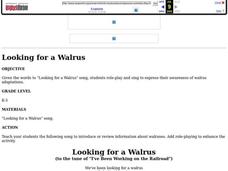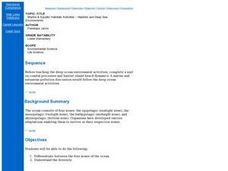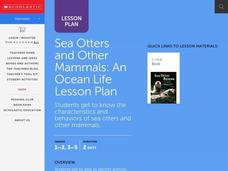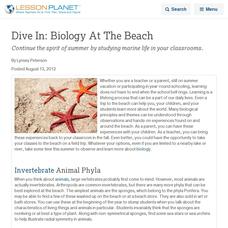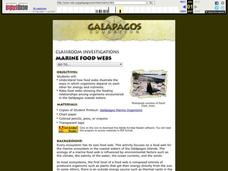Curated OER
Looking for a Walrus
Learners sing and role-play the song "Looking for a Walrus" to explore walrus adaptations.
Curated OER
Who's New in the Deep Sea?
Students examine the methods and technology that scientists use to study the deep sea and other remote environments. In this ocean habitats lesson students make observations about organisms from video clips, generate questions and use...
Curated OER
Learning About Mammals
Students study the mammal classification and forms of them living in the United States. In this mammal study lesson, students read through orders of mammals that exist in the United States. Students also study the taxonomy of an eastern...
Curated OER
Habitats and Deep Sea Environments
Students examine and identify the characteristics of the four zones of the ocean. They discover the amount of diversity in marine habitats. They also explore the adaptations organisms have that have allowed them to survive.
Curated OER
Ocean Life
Students identify marine mammals according to specific characteristics. Students read about marine mammals and list their characteristics. Next, students play a Whale and Otter game on the playground to simulate whales swimming across...
Curated OER
Food for Thought
Learners understand the importance of each member of a food chain through a game. In this food chains lesson, students receive background information and then play a game to simulate what happens in the food chain of an endangered...
Curated OER
The Living Environment
Fourth graders make a chart of animals and plants that live in either the desert, the ocean, or the tundra. In this environment lesson plan, 4th graders work in groups to discover characteristics needed for these animals to live in that...
Curated OER
Japan and The Ring of Fire
Young scholars engage in a study of the volcanic forces and earthquakes associated with The Ring of Fire in the Pacific Ocean. The people of Japan are researched in how they have dealt with living in the area. Also students write in...
Curated OER
Natural Inquirer
Students interview wildlife experts to gain information needed to research and write a report about an aquatic plant or animal affected by climate change.
Curated OER
Coral Reef Choreographic ProjectTo
Students enhance their understanding of how animals function in a habitat.Students are scattered individually and in small groups. About half of students make coral shapes in small groups. The other half of students move like animals in...
Curated OER
Dive In: Biology At The Beach
Continue the spirit of summer by studying marine life in your classrooms.
NOAA
I Didn’t Do It…Did I?: Make Your Own Greenhouse Effect
How do greenhouse gases affect the climate on Earth? Pupils explore the concept by first building their own apparatuses to model the greenhouse effect. Then, they record data to measure temperature change and determine that the amount...
Curated OER
Galapagos: Beyond Darwin
Students identify plants and animals endemic in their local area after learning about the plants and animals of the Galapagos Islands. In this plants and animals lesson plan, students create an endemic garden on school grounds.
Curated OER
Go Fish!
Young scholars are introduced to the culture of the Kumeyaay. Using their text, they discover how they used their native flora and fauna in San Diego. They participate in a matching game and examine the types of organisms who make their...
Curated OER
Marine Food Webs
Students examine how food webs illustrate the ways in which organisms depend on each other for energy and nutrients, and make food webs showing the feeding relationships among organisms encountered in the Gal??pagos coastal waters.
Curated OER
The Weight of Water
Students examine how salt water is more dense than fresh water. They discuss how manatees need to float and sink, conduct a sink or float experiment, and conduct an experiment with eggs and salt and fresh water.
Curated OER
Cypress/Tupelo Swamps
Young scholars study the geologic history of terrain, soils, and drainage patterns. They recognize ecological processes that determine the dynamic nature of habitats. They investigate the influence of human activity on the landscape.
Curated OER
Knowledge Quiz: Bacteria
For this bacteria quiz worksheet, students complete a set of 10 multiple choice questions covering a variety of concepts related to bacteria. A reference web site is included for additional resources.
Curated OER
Venom!
Students examine the nature of venom. They conduct an experiment to demonstrate how proteins such as venoms can be denatured using raw eggs, beakers, heated water, and compresses.
Curated OER
Creatures That Glow In The Night
Students investigate the different bioluminescent organisms. They use microscopes in order to make observations and draw what is seen. Students demonstrate they have studies the differences between the process of photosynthesis and...
Curated OER
Water Quality Monitoring
Students comprehend the four parameters of water quality. They perform tests for salinity, dissolved oxygen, pH and clarity or turbidity. Students comprehend why scientists and environmental managers monitor water uality and aquatic...
Curated OER
Survival of the Fittest
Sixth graders create their own "never before seen" marine creatures and examine how not all creatures in the sea swim, not all have sharp teeth
Curated OER
Change Happens
Fifth graders engage in a instructional activity to find information about the natural history of Puerto Rico. They practice using a variety of resources for research purposes. The same process of research is used for state of Wisconsin....
Georgia Department of Education
Ga Virtual Learning: Marine Invertebrates
Students learn about invertebrates found in the ocean, their individual methods of adaptations, identifying characteristics, and contributions to the marine ecosystem.


